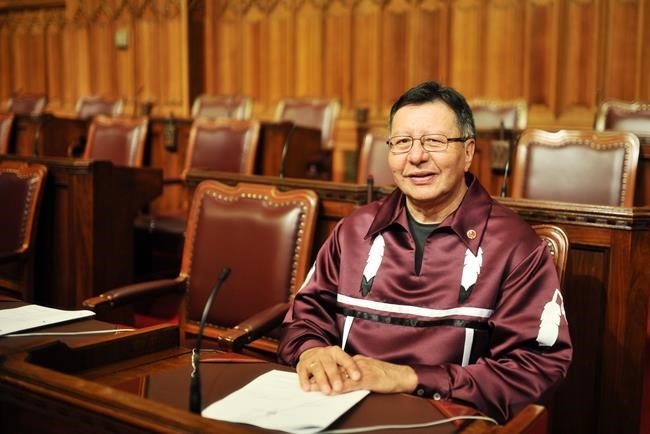
Senator Dan Christmas is shown in this undated handout image. The Mi'kmaq senator says Cape Breton could follow the lead of a First Nation that transformed itself economically through self-sufficiency and discuss separating from Nova Scotia.THE CANADIAN PRESS/HO-office of Senator Dan Christmas-Sarah Dea *MANDATORY CREDIT *
Republished November 07, 2017 - 12:20 PM
Original Publication Date November 07, 2017 - 8:16 AM
A Mi'kmaq senator says Cape Breton could follow the lead of a First Nation that transformed itself economically through self-sufficiency, and discuss separating from Nova Scotia.
Sen. Daniel Christmas said the Nova Scotia island is "dying" and he predicts depopulation and high unemployment rates will continue unless drastic action is taken.
Christmas said Cape Breton should start discussing its independence and could borrow from the self-reliant economic model he helped craft for Membertou First Nation two decades ago.
Membertou is just outside Sydney, Cape Breton's largest community, and has become one of the most prosperous Indigenous communities in the country.
"The question I wanted to ask is, would Cape Breton be better off as the 11th province of Canada, not only for Cape Breton, but also for Nova Scotia and Canada?" Christmas said in a phone interview from Ottawa on Tuesday.
"When I think of Cape Breton as a whole, I think of my own community some 20 years ago. We started relying on ourselves. We wanted to (change) the status quo, and it was dramatic and a lot of hard work ... but I've been thinking Cape Breton needs to do the same thing."
Christmas — named to the Senate last fall by Prime Minister Justin Trudeau — first made the proposal last Thursday during the inaugural Father Greg MacLeod lecture at the Membertou Trade and Convention Centre.
He conceded the proposal is a complex one, and examining it will take some time — but said the purpose of his speech was merely to inspire the discussion.
Premier Stephen McNeil said Tuesday it's vital for the government to listen to frustrations voiced from different parts of the province, but made it clear that he thought Cape Breton's future is brightest inside Nova Scotia.
"Cape Breton's economic future is Nova Scotia's economic future and I think staying together is the only way to continue to chart the path we are on," he said.
Christmas cited bleak statistics, including that Cape Breton's population has declined by nearly 30,000 since 1991. About 132,000 people lived on the island in 2016.
"What I was trying to do was to inspire people to think different," said Christmas. "Maybe if we took care of ourselves — if we relied on just ourselves — perhaps these numbers can turn around."
Christmas was instrumental in the development of Membertou, which during the late 1990s was on the brink of bankruptcy and grappling with a 95-per-cent unemployment rate.
He and other leaders revamped the First Nation, now a thriving community of roughly 1,400 people with its own schools, daycares, convention centre, market and ice rink.
In 1995, Membertou had 37 employees and a $4-million budget with a $1-million deficit, the band's website said. Its workforce has grown to about 550 during peak seasons and its operating budget is around $112 million, it said.
In his lecture, Christmas said that while Membertou is succeeding, the rest of the island languishes.
"The hard and fundamentally tragic reality is that Cape Breton is dying," Christmas said in a written copy of his speech provided to The Canadian Press. "We are slowly bleeding to death."
Christmas asked: "Is it now time for us to take full political responsibility for ourselves as an island, and take complete charge of our own future? Is it time to think about Cape Breton Island, once again, becoming its own political body or its own province within Canada?"
Lachlan MacKinnon, a post-doctoral fellow at Saint Mary's University in Halifax, said Christmas's comments are reflective of an "impulse that comes up every 20 years or so," during moments of crisis.
He said the sentiment had a voice in the late 1960s when private industry vacated the island's coal mines and steel plant.
MacKinnon said that led to the creation of Crown corporations such as the Cape Breton Development Corporation, which administered the coal sector, and the Sydney Steel Corporation.
"Largely as a response to community based activism that's rooted in that sense of cultural unity surrounding the island itself," said MacKinnon.
MacKinnon said it would be very difficult, constitutionally, to make Cape Breton a province.
"Senator Christmas admittedly says this is a project that would be 15 or 20 years in the making, so it's certainly not a solution that's going to be solving those problems tomorrow. I think as it is today that would be a very uphill battle."
Cape Breton has been independent in the past, including during the 18th century when it was a British colony.
Christmas said he has received a great deal of reaction since his lecture, with some supporting independence and others dismissing it as unreasonable.
"I guess when you propose something that's somewhat radical, you can expect a whole range of reactions," he said.
News from © The Canadian Press, 2017